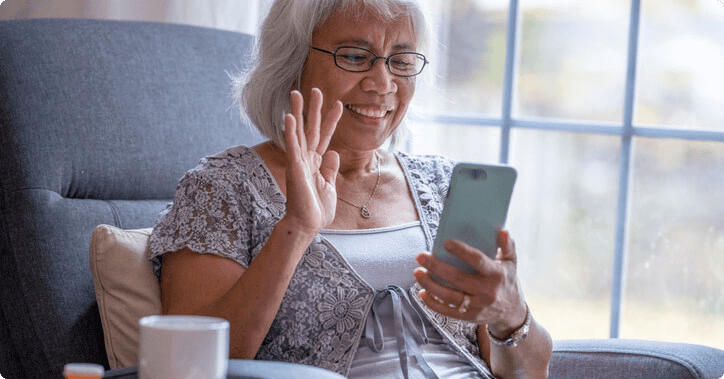Get Your Free Mesothelioma Guide

Find a Top Mesothelioma Doctor

Access Help Paying for Treatment

Long-distance caregiving for a person with mesothelioma may involve arranging in-home care, making medical appointments, managing financial and legal affairs, providing respite care and planning for emergencies.
A long-distance mesothelioma caregiver is someone who lives an hour or more away from a person with mesothelioma who needs your help.
According to the American Association of Retired Persons (AARP), an estimated 11 percent of family caregivers live at least an hour away from a loved one they care for. They face an additional set of challenges and stressors compared to caregivers who live nearby.
For example, long-distance caregivers spend more of their own money on caregiving because they will more likely need to hire help, take time off work and pay for travel. They also worry about the kind of care their loved is getting in their absence.
There are steps long-distance caregivers can take to handle these kinds of concerns and getting organized is the first step.
Get Your Free Mesothelioma Guide

Find a Top Mesothelioma Doctor

Access Help Paying for Treatment

Long-distance caregivers worry about staying informed and assured their loved one is receiving good care. Getting health care and medical matters organized will help you manage long-distance caregiving.
Disorganization and missed care can be stressful for caregivers. A 2021 research study noted that mesothelioma patients do not seem to have high needs for psychosocial support, whereas carers do.
Aim to get everything arranged during an initial in-person visit. This may require you to take a day or more off work to accommodate medical and legal appointments.
Spending time at the beginning to understand your situation will help you develop a plan for long-distance caregiving.
You will need signed documents allowing doctors, hospitals and insurance companies to share medical information with you.
Long-distance caregivers who have durable power of attorney for the health care of their loved one have the right to request access to medical records.
Those who do not have power of attorney for health care must ask each medical provider to provide medical release forms to be signed by the patient or their legal guardian.
One route for accessing financial information is durable power of attorney for financial decisions.
This designation allows long-distance caregivers to access their loved one’s financial information. Consider the following when getting financial affairs in order.
Consider the following when the time comes to get legal affairs in order.

Get help finding a top attorney who can get you the compensation you deserve.
Get Help NowHome care services include a wide range of caregiving and health care services. This kind of care is provided by a variety of professionals including personal care aides, nurses, therapists, social workers and home medical equipment operators.
You may need home care services if:
Consider reaching out to friends, family, neighbors, religious organizations and local resources.
Setting up an emergency plan helps mesothelioma patients and their caregivers respond well in case of an emergency. Consider the following when creating an emergency plan.

Understand your diagnosis, top doctors and ways to afford care.
Get Your Free GuideConsider the following to help you prepare for unplanned travel.
Long-distance caregivers can ask someone living closer to the person with mesothelioma to serve as a local point of contact. This person might be a neighbor, friend, family member or a hired caregiving professional.
If one person can’t fully serve this role, consider asking several people to help out with various roles. For example, consider asking a neighbor to check on the house and make sure the mail is being picked up. Maybe a local friend could stop by once a week to visit and check on your loved one.
Long-distance caregivers can feel overwhelmed by how much they want to get done during a visit. Thoughtful planning in advance can help. Consider the following to make the most of your visits.
If you have a smartphone, you can look into downloading a caregiver app to help coordinate care. If you don’t have a smartphone, caregiver apps are accessible through a tablet or computer.

These apps help you create and manage a community of care for your loved one. They allow multiple caregivers to stay in touch and share medical and caregiving updates.
Consider the following caregiver apps to coordinate care.
Your web browser is no longer supported by Microsoft. Update your browser for more security, speed and compatibility.
If you are looking for mesothelioma support, please contact our Patient Advocates at (855) 404-4592
The Mesothelioma Center at Asbestos.com has provided patients and their loved ones the most updated and reliable information on mesothelioma and asbestos exposure since 2006.
Our team of Patient Advocates includes a medical doctor, a registered nurse, health services administrators, veterans, VA-accredited Claims Agents, an oncology patient navigator and hospice care expert. Their combined expertise means we help any mesothelioma patient or loved one through every step of their cancer journey.
More than 30 contributors, including mesothelioma doctors, survivors, health care professionals and other experts, have peer-reviewed our website and written unique research-driven articles to ensure you get the highest-quality medical and health information.
My family has only the highest compliment for the assistance and support that we received from The Mesothelioma Center. This is a staff of compassionate and knowledgeable individuals who respect what your family is experiencing and who go the extra mile to make an unfortunate diagnosis less stressful. Information and assistance were provided by The Mesothelioma Center at no cost to our family.LashawnMesothelioma patient’s daughter


Whitmer, M. (2025, June 5). Long-Distance Caregiving. Asbestos.com. Retrieved July 2, 2025, from https://www.asbestos.com/support/caregivers/long-distance/
Whitmer, Michelle. "Long-Distance Caregiving." Asbestos.com, 5 Jun 2025, https://www.asbestos.com/support/caregivers/long-distance/.
Whitmer, Michelle. "Long-Distance Caregiving." Asbestos.com. Last modified June 5, 2025. https://www.asbestos.com/support/caregivers/long-distance/.
Michelle Whitmer has covered science and medicine for Asbestos.com for more than 15 years. She has been featured in multiplatform media, including The New York Times and KYW Newsradio. Whitmer is pursuing American Medical Writers Association certification, has completed OSHA Asbestos Standard for the Construction Industry training and is CDC certified in Health Literacy.
Our fact-checking process begins with a thorough review of all sources to ensure they are high quality. Then we cross-check the facts with original medical or scientific reports published by those sources, or we validate the facts with reputable news organizations, medical and scientific experts and other health experts. Each page includes all sources for full transparency.
Please read our editorial guidelines to learn more about our content creation and review process.
